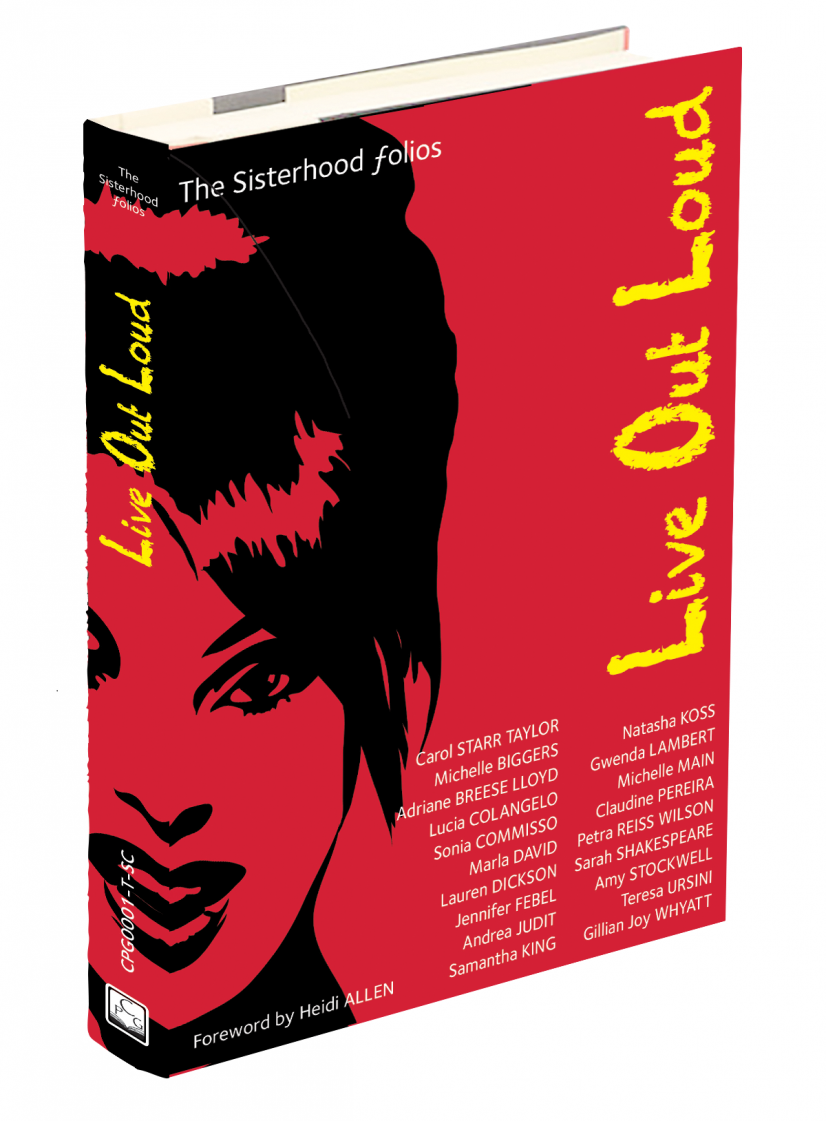Musique ••• Classique & jazz ••• Venerem, Strike
When my life will begin again

In French, there is no translation stricto sensu to "sisterhood." To qualify the links between sisters, our language uses the term "fraternité" ("brotherhood"). This word is valid for both sexes. Some will also say that, symbolically, it also ignores any idea of emotional ties between sisters – whether it is real sisters ou soul sisters. These links form the plot of The Sisterhood Chronicles: Live out Loud, prefaced by Heidi Allen.
In this collection, 18 women chronicle moments of life – these "little pieces", as Marla David says (Peace By Piece: Forging a Path Forward Through Writing). Testimonies, family paintings, introspections, encounters or personal narratives compose a book with great homogeneity.
The reader will not find any sensational events. The Sisterhood Chronicles gives us to see often tragic but ordinary facts: a child 's disease (Natasha Koss, From Rock Bottom I Found My Truth), abandonment and separation (Peace by Piece), the hatred of a mum (Carol Starr Taylor, Mamma Mia), unhappy childhood (Teresa Ursini, Know Thyself), sexual Abuse (Gwenda Lambert, Now, I Sing Again), domestic violence (Andrea Judit, Unchained - or I Was Married to a Narcissist and Survived), bereavement (Gillian Joy Whyatt, Daddy: I was always his Angel and now he's mine), addicts (Adriane Breese Lloyd, The Wind Beneath my Wings) or fear (Amy Stockwell, 6 Steps For Living Your Truth), depression (Jennifer Febel, Unbroken).
Sisterhood Chronicles: a depressing collection that would give you cravings for rope? Not at all ! Because what interests the authors is how to meet the challenges of life, even in the most desperate situations. Moreover, it is no coincidence that many of these women work as coaches (Marla David), specialist teachers (Michelle Biggers), therapists (Andrea Judit Goldberger), researchers (Petra Reiss Wilson), lecturers (Jennifer Febel) or consultants (Claudine Claudine Pereira). This is why these women explain why they write about yoga, meditation, listening to oneself, unconscious, lucid dreams or spiritual guides (Claudine Pereira, Life Lessons Learned From the School of Hard Knocks! What Would I Tell My Younger Self).
In The Main Message: You Can Change Your Life, Michelle Main talks about a life with existential anxiety, which the author says is freed from the most conventional therapies (massage therapy, naturopathy or equine therapy). Unbroken talks about a young woman "broken" by life, until the reconquest of her own person. This revival can be achieved through writing, following the example of Marla David (Peace by Piece: Forging a Path Forward Through Writing by Marla David), a chronicle about the concept of life: "Life is a quest. Life is a thrill. Life is a romance. Life is a lark. Life is!"
In The Sisterwood Chronicles, there is this frank and disconcerting confidence of Lauren Dickson: "I do not want to find my other half" (On the Wrong Side of Love). Samantha King talks about the Grail which is the balanced between work and personnal life (The Holy Grail of Womanhood). This illusion leads millions of women in a series of alienations: "As women, we are pulled in a million different directions based on whatever is screaming the loudest — sometimes that’s our career/business; sometimes it’s our marriage; sometimes it’s other areas of our personal life…" Samantha King writes how she was able to overcome this dilemma: "The ‘a place for everything and everything in its place’ philosophy was thrown out the window. My empire (I call it a fempire) is more than just my career, and I’m not the only woman in this boat."
To leave her comfort zone is an invitation proposed by several chroniclers to be able to find oneself, to be fulfilled ("Be yourself, everyone else is already taken", said Oscar Wilde), to be guided by his passions or accomplish a "journey towards love" (Lauren Dickson, On the Wrong Side of Love). And in this battlefield that can be a life, there are the others, the close ones, an husband (Teresa Ursini, Know Thyself) or some friends.
These friends - whether friends for life or friends of a season, as Heida Allen recalls in his preface - are at the center of this delightful novel by Lucia Colangelo, My Vintage Collection. In this chronicle about friendship (the "sisterhood" of the title), the author makes the search for bottles of wine the opportunity to talk about her friends. Each bottle - European, Greek or Italian wines, but singularly no French wine ! - is identified with one of those women : "These women were truly like fine wine, they all have a journey that created their individuality, their complexity."
The French reader will be able to find in his American voices matter to question universal life lessons that speak to us of "life out loud": fighting and not living in the past, taking up the challenges (Gillian Joy Whyatt, Daddy: I was always his Angel and now he's mine), accepting his faults and convincing himself that the we can win big wars with small victories (My Beautiful Pathetic Life). The French reader may be fascinated by this very American spirit of believing in a divine destiny ("For every one who leaves, God has someone even greater in store for me, and I keep my hope in that", writes Lauren Dickson). At the same time, this spirit can encourage individual freedom to get along, to understand oneself and to undertake.
These 18 chronicles are universal lessons for finally beginning to live.
Carol Starr Taylor, The Sisterhood Chronicles: Live out Loud,
Creative Publishing Group, 2017
"Lorsque ma vie (re)commencera"
"5.000 amies"
